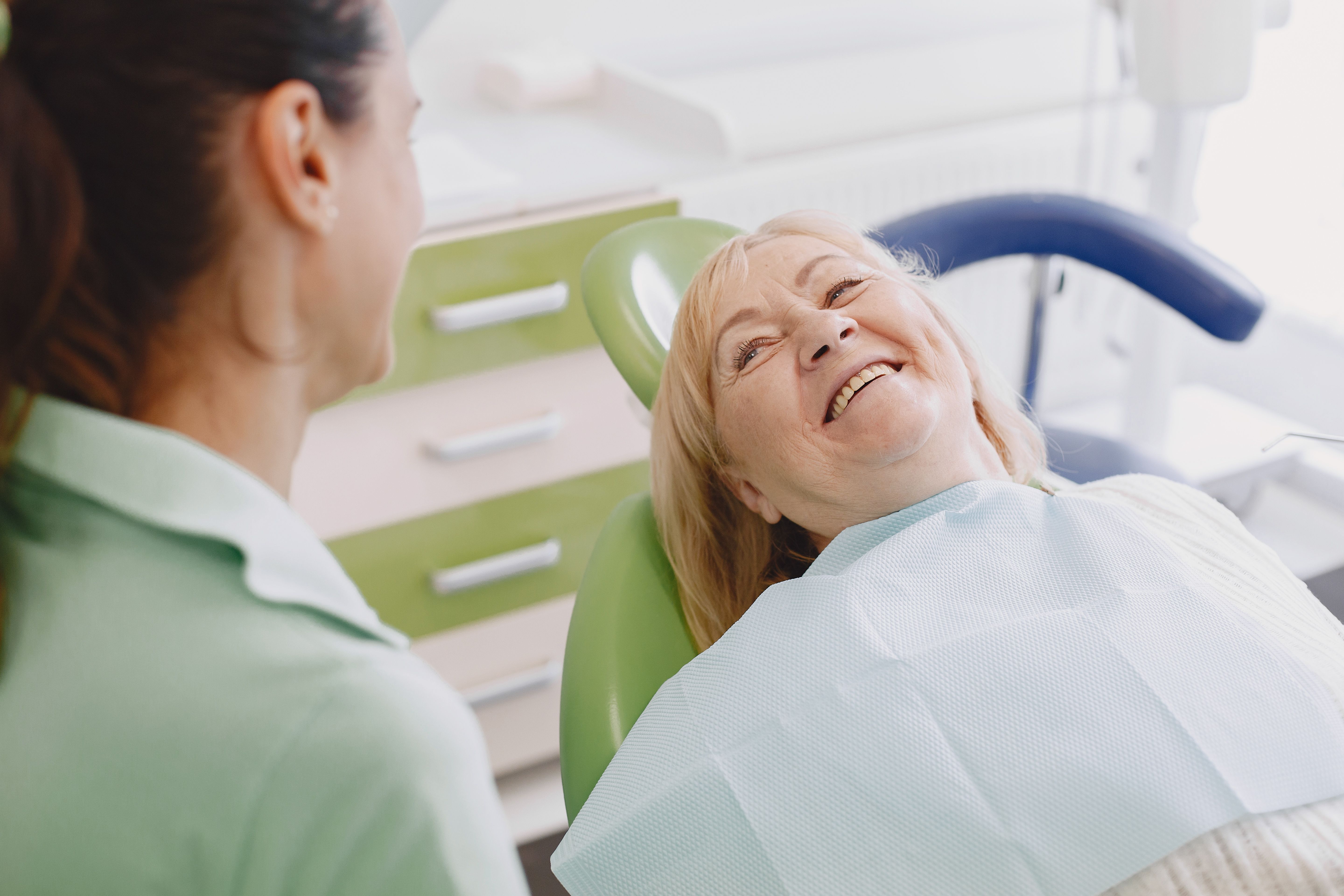October 21, 2025
How Hormonal Changes Affect Gum Health in Women

Key Points
- Women experience unique gum health challenges due to hormonal fluctuations throughout their lives.
- Up to 75% of pregnant women develop pregnancy gingivitis due to increased progesterone levels.
- Hormonal changes during puberty can increase gum sensitivity and bleeding by up to 50%.
- Women are more susceptible to periodontal disease during menopause when estrogen levels drop.
- Birth control pills and hormone therapy can affect how gums respond to bacterial plaque.
- Menstrual cycles can cause temporary gum inflammation and increased bleeding during certain phases.
- Regular dental care at practices like Silver State Smiles can help women manage hormone-related gum issues effectively.
Overview
Women's oral health is intricately connected to their hormonal health in ways that many don't realize. From puberty through menopause, fluctuating hormone levels can significantly impact gum tissue, making women more vulnerable to various periodontal conditions at different life stages.
Understanding this connection is crucial for maintaining optimal oral health. Hormones affect blood flow to gum tissue, the body's response to toxins from plaque buildup, and even how quickly gum tissue repairs itself after damage.
This blog post from Silver State Smiles explores how hormonal changes at different life stages affect women's gum health and provides practical strategies to protect your smile through every phase of life.
1. Puberty and Increased Gum Sensitivity
During puberty, the surge in sex hormones, particularly estrogen and progesterone, increases blood flow to the gums. This makes gum tissue more sensitive to irritation from plaque and bacteria.
Young women going through puberty often notice their gums bleeding more easily during brushing or flossing, even with proper oral hygiene. The gums may appear redder, feel tender, or swell more noticeably in response to minor irritants.
Common Puberty-Related Gum Issues:
- Increased gum bleeding during routine brushing
- Swollen or puffy gum tissue
- Heightened sensitivity to plaque buildup
- Temporary gum inflammation
- Increased risk of developing gingivitis
The Solution: Maintain consistent oral hygiene with twice-daily brushing and daily flossing. Schedule regular dental cleanings every six months to remove plaque and tartar that home care might miss. Using an antimicrobial mouthwash can help reduce bacterial buildup during this sensitive period.
2. Menstrual Cycle and Periodic Gum Changes
Many women experience cyclical changes in their gum health that correspond with their menstrual cycle. These changes typically occur in the days leading up to menstruation when progesterone levels peak.
Some women develop menstruation gingivitis, experiencing bright red, swollen gums that bleed easily in the days before their period. These symptoms usually resolve once menstruation begins and hormone levels stabilize.
Menstrual-Related Symptoms:
- Swollen, tender gums before periods
- Increased bleeding during brushing or flossing
- Canker sores or cold sores
- Swollen salivary glands
- Temporary bad breath
The Solution: Track your symptoms to identify patterns and be extra diligent with oral hygiene during the week before your period. If symptoms are severe or persistent, consult with your dentist about additional preventive measures or treatment options.
3. Pregnancy and Gum Disease Risk
Pregnancy brings dramatic hormonal changes that significantly impact gum health. Elevated progesterone levels increase blood flow to gum tissue and change how your body responds to the bacteria in plaque.
Pregnancy gingivitis affects up to 75% of expectant mothers, typically beginning in the second month and peaking in the eighth month. Without proper care, this can progress to more serious periodontal disease, which has been linked to preterm birth and low birth weight.
Pregnancy Gum Complications:
- Pregnancy gingivitis with red, swollen, bleeding gums
- Pregnancy tumors (pyogenic granuloma) - benign growths on gums
- Increased tooth mobility due to hormonal effects on ligaments
- Greater susceptibility to cavities
- Potential link between gum disease and pregnancy complications
The Solution: Inform your dentist about your pregnancy and schedule at least one cleaning during the second trimester. Maintain excellent oral hygiene at home and consider using a soft-bristled toothbrush if gums are particularly sensitive. Address any dental issues before pregnancy when possible.
4. Birth Control and Hormone Therapy Effects
Oral contraceptives and hormone replacement therapy can affect gum health similarly to pregnancy, though typically less severely. The synthetic hormones in birth control pills can cause gum tissue to overreact to plaque irritants.
Women taking birth control pills may notice increased gum inflammation or bleeding, particularly when first starting the medication. These effects usually diminish as the body adjusts to the hormonal changes.
Medication-Related Considerations:
- Increased inflammation in response to plaque
- Heightened risk of dry socket after tooth extractions
- Potential interactions with certain dental medications
- Need for antibiotic coverage before some dental procedures
- Changes in how gums heal after dental work
The Solution: Always inform your dentist about any hormonal medications you're taking, including birth control pills and hormone replacement therapy. This information helps them tailor your preventive care and treatment plans appropriately.
5. Menopause and Declining Gum Health
Menopause brings declining estrogen levels that can significantly affect oral health. Many women experience dry mouth, altered taste sensations, and increased vulnerability to gum disease during this transition.
The reduction in estrogen affects bone density throughout the body, including the jawbone that supports teeth. This can contribute to tooth loss if periodontal disease is present. Additionally, decreased saliva production reduces the mouth's natural defense against bacteria.
Menopausal Oral Health Changes:
- Burning mouth syndrome
- Dry mouth (xerostomia)
- Altered taste perception
- Increased bone loss in the jaw
- Greater susceptibility to periodontal disease
- Gum recession and tooth sensitivity
The Solution: Stay hydrated and consider saliva substitutes if dry mouth is problematic. Discuss calcium and vitamin D supplementation with your healthcare provider to support bone health. Increase the frequency of dental checkups to monitor for signs of gum disease or bone loss.
6. The Role of Stress Hormones
While not exclusively a women's issue, stress hormones like cortisol can compound the effects of sex hormone fluctuations on gum health. High stress levels suppress immune function and make it harder for the body to fight off the bacteria that cause gum disease.
Women juggling multiple responsibilities often experience chronic stress that manifests in their oral health through increased inflammation, teeth grinding, and neglected oral hygiene routines.
Stress-Related Impacts:
- Weakened immune response to oral bacteria
- Increased inflammation throughout the body
- Teeth grinding (bruxism) that damages gums and teeth
- Neglected oral hygiene during stressful periods
- Delayed healing of gum tissue
The Solution: Incorporate stress management techniques into your daily routine and maintain consistent oral hygiene even during busy periods. If you grind your teeth, ask your dentist about a custom night guard to protect your teeth and gums.
Protective Strategies:
- Schedule dental cleanings at least twice yearly, more frequently during hormonal transitions
- Maintain excellent home oral hygiene with proper brushing and flossing techniques
- Use therapeutic mouthwashes when recommended
- Stay informed about how your current life stage affects oral health
- Address dental concerns promptly rather than waiting
Professional Dental Support for Women
Managing hormone-related gum health requires a dental team that understands the unique challenges women face. Silver State Smiles provides comprehensive dental care with special attention to how hormonal changes affect oral health at every life stage.
Professional dental support includes:
- Personalized preventive care based on your hormonal status
- Early detection and treatment of hormone-related gum issues
- Education about managing oral health during life transitions
- Gentle, effective treatments for sensitive gum tissue
- Coordination with other healthcare providers when needed
Protecting Your Smile Through Every Life Stage
Your gums deserve special attention during times of hormonal change. By understanding how hormones affect oral health and taking proactive steps to protect your gums, you can maintain a healthy smile throughout your life.
The connection between hormones and gum health isn't something to worry about, but rather to be aware of so you can adjust your care accordingly. Simple steps like maintaining consistent oral hygiene, scheduling regular dental visits, and communicating with your dental team about hormonal changes can prevent most hormone-related gum problems.
Whether you're navigating puberty, pregnancy, menopause, or any stage in between, prioritizing your gum health protects not just your smile but your overall wellbeing. Don't let hormonal changes compromise your oral health when effective prevention and treatment options are readily available.

Schedule Your Visit Today
Experience exceptional dental care in a comfortable, state-of-the-art environment. New patients welcome!
